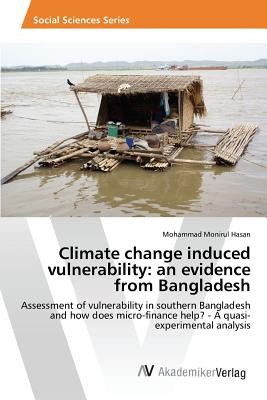
- We will send in 10–14 business days.
- Author: Hasan Mohammad Monirul
- Publisher: AV Akademikerverlag
- Year: 2015
- Pages: 104
- ISBN-10: 3639876237
- ISBN-13: 9783639876239
- Format: 15.2 x 22.9 x 0.6 cm, minkšti viršeliai
- Language: English
- SAVE -10% with code: EXTRA
Reviews
Description
This study examines food consumption vulnerability of the extreme poor households in the southern Bangladesh and explore how micro-finance contributes to reduce vulnerability. Households in this areas are vulnerable to climate change. This study analyzes the economic impact of last two big cyclones such as "Sidr" and "Aila". In finding the determinants of vulnerability, econometric analysis is performed using ordered probit model. Heckman two-step model is applied to test the sample selection bias in the model. In this quasi-experimental study, propensity score matching (PSM) technique is used to find out the impact of two big cyclones and also the contribution of micro-finance participation on vulnerability. Apart from finding the determinants of food consumption vulnerability, micro-finance participation is found to be the significant determinant in reducing vulnerability. It can reduce both 2˚and 1˚vulnerability by 2.3% point. In Propensity Score Matching (PSM) analysis, the impact is 8% reduction of vulnerability. Conversely, the last two cyclones increase the vulnerability by 8% to 14% point. The study also provides some short and long term policy suggestions for this area.
EXTRA 10 % discount with code: EXTRA
The promotion ends in 23d.18:05:54
The discount code is valid when purchasing from 10 €. Discounts do not stack.
- Author: Hasan Mohammad Monirul
- Publisher: AV Akademikerverlag
- Year: 2015
- Pages: 104
- ISBN-10: 3639876237
- ISBN-13: 9783639876239
- Format: 15.2 x 22.9 x 0.6 cm, minkšti viršeliai
- Language: English English
This study examines food consumption vulnerability of the extreme poor households in the southern Bangladesh and explore how micro-finance contributes to reduce vulnerability. Households in this areas are vulnerable to climate change. This study analyzes the economic impact of last two big cyclones such as "Sidr" and "Aila". In finding the determinants of vulnerability, econometric analysis is performed using ordered probit model. Heckman two-step model is applied to test the sample selection bias in the model. In this quasi-experimental study, propensity score matching (PSM) technique is used to find out the impact of two big cyclones and also the contribution of micro-finance participation on vulnerability. Apart from finding the determinants of food consumption vulnerability, micro-finance participation is found to be the significant determinant in reducing vulnerability. It can reduce both 2˚and 1˚vulnerability by 2.3% point. In Propensity Score Matching (PSM) analysis, the impact is 8% reduction of vulnerability. Conversely, the last two cyclones increase the vulnerability by 8% to 14% point. The study also provides some short and long term policy suggestions for this area.


Reviews